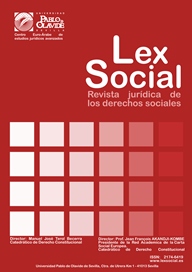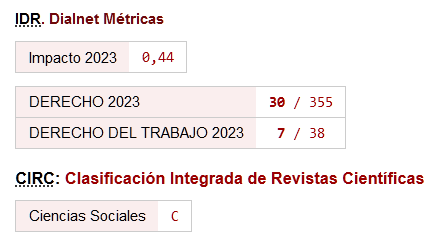Human work in the first line of the pandemic: social and health assistance
DOI:
https://doi.org/10.46661/lexsocial.5972Keywords:
Covid-19, first-rate health professionals, risksAbstract
In analysis a health problem that has lasted for more than a year and it is not known when it ends. Globally, Covid-19 has hit the healthcare and social sectors hard. First-line health professionals have proven themselves to be true heroes in this muscular fight against the new SARS-CoV-2 virus.
The objectives are: to identify the implications of the pandemic in the human work of health professionals of the first line, namely in women as the face of this work, as well as to analyze the epidemiology of the disease and socio-health care.
We proceeded to a literature review on the topic considering publications from the beginning of the pandemic to the present moment.
The serious impact of the Covid-19 pandemic is explicit in the reported numbers and first-line health professionals are particularly exposed to physical and psychological risk.
Scientific advances, widespread dissemination to better understand the virus and how to control it, international cooperation, as well as vaccination and the most effective drugs for treatment have accompanied this process and kept hope for the future.
Downloads
References
ALMEIDA, Teresa Caldas de et al, Relatório Final: SM-Covid19 – Saúde Mental em Tempos de Pandemia, Lisboa, Instituto Nacional de Saúde Doutor Ricardo Jorge, 2020.
ANDERSON, RM, HEESTERBEEK, H, KLINKENBERG, D, HOLLINGSWORTH, TD, “How will country-based mitigation measures influence the course of the COVID-19 epidemic?”, Lancet, 2020, 395, 931–34.
BROOKS, Samantha et al, “The psychological impact of quarantine and how to reduce it: Rapid review of the evidence”, Lancet, 2020, 395(102227), 912-20. http://doi.org/10.1016/S0140- 6736(20)30460-8
CHEN, Nanshan et al, “Epidemiological and clinical characteristics of 99 cases of 2019 novel coronavirus pneumonia in Wuhan, China: a descriptive study”, Lancet, 2020, 395, 507–13.
DEMARTINI, Karine et al. “Care for frontline health care workers in times of COVID-19”, Rev. Soc. Bras. Med. Trop., 2020, vol.53, e20200358, https://doi.org/10.1590/0037-8682-0358-2020
HOFFMANN, Christian, KAMPS, Bernd Sebastian, COVID Reference, Volume 1, Hamburg, Steinhäuser Verlag, 2020.
HUANG, Chaolin et al, “Clinical features of patients infected with 2019 novel coronavirus in Wuhan, China”, Lancet, 2020, 395, 497–506.
KSIAZEK, TG et al, “A novel coronavirus associated with severe acute respiratory syndrome”. N Engl J Med. 2003, 348, 1953-1966.
LAI, Jiambo et al, “Factors Associated With Mental Health Outcomes Among Health Care Workers Exposed to Coronavirus Disease 2019”, JAMA, 2020, 3(3), e203976, https://doi.org/10.1001/jamanetworkopen.2020.3976.
NGUYEN, LONG et al. “Risk of COVID-19 among front-line health-care workers and the general community: a prospective cohort study”, Lancet Public Health, 2020, 5, e475–83.
RODRÍGUEZ-REY, Rocío, GARRIDO-HERNANSAIZ, Helena and BUENO-GUERRA, Nereida, “Working in the Times of COVID-19. Psychological Impact of the Pandemic in Frontline Workers in Spain”. International Journal of Environmental Research and Public Health, 2020, vol. 17, 21 8149, doi:10.3390/ijerph17218149
ROGERS, Jonathan, CHESNEY, Edward and OLIVER, Dominic, “Psychiatric and neuropsychiatric presentations associated with severe coronavirus infections: a systematic review and meta-analysis with comparison to the COVID-19 pandemic”, Lancet Psychiatry. 2020, 7(7), 611-627, ht tps://doi.org/10.1016/S2215- 0366(20)30203- 0
Downloads
Published
How to Cite
Issue
Section
License

This work is licensed under a Creative Commons Attribution-NonCommercial-NoDerivatives 4.0 International License.
-
Atribución — Usted debe dar crédito de manera adecuada, brindar un enlace a la licencia, e indicar si se han realizado cambios. Puede hacerlo en cualquier forma razonable, pero no de forma tal que sugiera que usted o su uso tienen el apoyo de la licenciante.
-
NoComercial — Usted no puede hacer uso del material con propósitos comerciales.
-
CompartirIgual — Si remezcla, transforma o crea a partir del material, deberá difundir sus contribuciones bajo la misma licencia que el original.



 @Lex Social
@Lex Social Linkedin
Linkedin @lexrevista.bsky.social
@lexrevista.bsky.social


